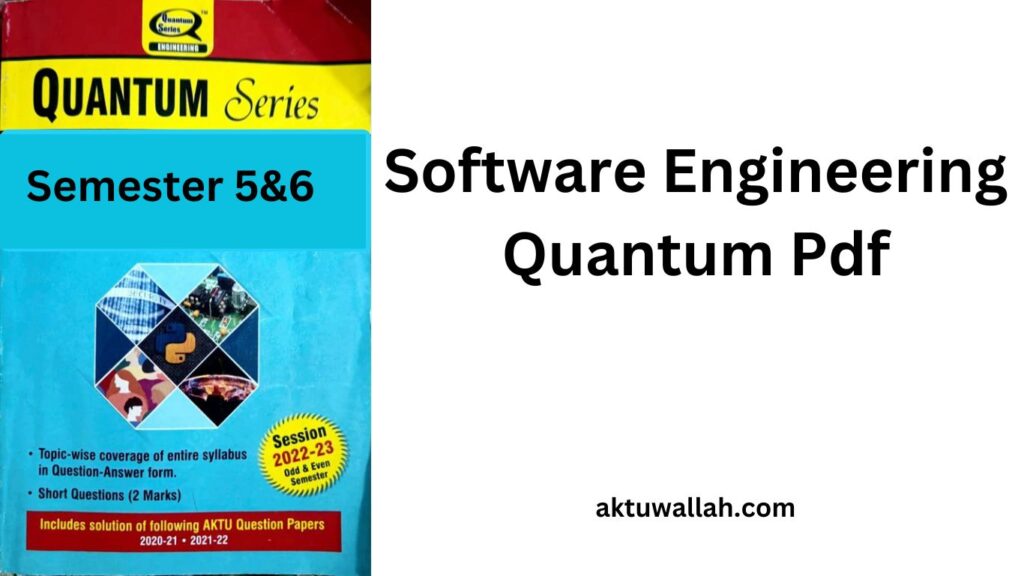Download Software Engineering Quantum Pdf For Aktu B-tech 3rd Year:
Are you an AKTU B-Tech 3rd-year student looking for a concise yet comprehensive resource on Software Engineering quantum pdf? Look no further! In this article, we will guide you on how to download a Software Engineering Quantum Pdf that covers the key topics of Software Engineering. Whether you’re preparing for an exam or seeking a quick reference guide, this downloadable PDF will provide you with the necessary insights. Let’s dive in and explore the world of Software Engineering!
How to download Software Engineering Quantum PDF Notes for free?
Click on the given link to download it:
GET PDF
Download other quantum PDF for Aktu B-tech 3rd year: Click Here
Download Aktu Syllabus of B-tech 3rd year: Click Here
Download Handwritten Notes of all subjects: Click Here
Visit AKTU official site to explore more
Key topics covered in the Software Engineering Quantum Pdf:
Table of Contents
- Introduction to Software Engineering
- Software Development Life Cycle (SDLC)
- Waterfall Model
- Agile Methodology
- Requirements Engineering
- Software Design Principles
- Software Testing and Quality Assurance
- Software Maintenance and Evolution
- Software Metrics and Measurement
- Software Project Management
- Software Configuration Management
- Software Documentation
- Software Reliability and Dependability
- Software Security and Privacy
- Emerging Trends in Software Engineering
- Case Studies in Software Engineering
- Conclusion
Introduction to Software Engineering
In this section, we will provide a brief overview of Software Engineering. Software Engineering is a discipline that focuses on the systematic development, operation, and maintenance of software systems. It involves various processes, methodologies, and tools to ensure the efficient and reliable creation of software products.
Software Development Life Cycle (SDLC)
The Software Development Life Cycle (SDLC) is a framework that guides the development process from inception to deployment. In this section, we will discuss two prominent SDLC models: the Waterfall Model and Agile Methodology. The Waterfall Model follows a linear sequential approach, while Agile Methodology emphasizes iterative and incremental development.
Requirements Engineering
Requirements Engineering is a crucial phase in software development, as it involves gathering, analyzing, and documenting the needs of stakeholders. This section will delve into the importance of requirements engineering and the various techniques used to elicit and specify software requirements effectively.
Software Design Principles
Software Design Principles provide guidelines for creating high-quality software architectures. This section will explore fundamental design principles such as abstraction, modularity, encapsulation, and inheritance. Understanding these principles will help you design robust and maintainable software systems.
Software Testing and Quality Assurance
Software Testing and Quality Assurance play a vital role in ensuring the reliability and correctness of software. Here, we will discuss different types of testing, including unit testing, integration testing, system testing, and acceptance testing. Additionally, we will touch upon quality assurance techniques and tools used to enhance the overall quality of software products.
Software Maintenance and Evolution
Software Maintenance and Evolution involve activities related to modifying, enhancing, and optimizing existing software systems. This section will highlight the importance of maintenance and evolution, and the challenges faced in managing and upgrading software throughout its lifecycle.
Software Metrics and Measurement
Software Metrics and Measurement provide a quantitative approach to evaluate and improve software quality. Here, we will explore various metrics used to assess software characteristics such as complexity, maintainability, and reliability. Understanding software metrics will enable you to make informed decisions and track the progress of software projects.
Software Project Management
Software Project Management involves planning, organizing, and controlling software development projects. In this section, we will discuss project management methodologies, such as the Waterfall Model, Agile, and Scrum. Additionally, we will cover key project management activities, including resource allocation, scheduling, and risk management.
Software Configuration Management
Software Configuration Management focuses on managing and controlling changes to software systems. This section will explain the importance of configuration management and introduce tools and techniques used to track, version, and control software artifacts effectively.
Software Documentation
Software Documentation plays a crucial role in facilitating communication and knowledge transfer among stakeholders. Here, we will explore different types of documentation, such as requirements documents, design documents, and user manuals. Additionally, we will discuss best practices for creating concise and comprehensive software documentation.
Software Reliability and Dependability
Software Reliability and Dependability are essential aspects of software engineering. This section will delve into techniques used to enhance software reliability, including fault tolerance, error detection and recovery, and failure analysis. We will also discuss the concept of software dependability and its implications for critical software systems.
Software Security and Privacy
Software Security and Privacy are significant concerns in today’s interconnected world. Here, we will examine various security threats and vulnerabilities that software systems face. We will also discuss strategies and techniques to mitigate these risks and protect sensitive data.
Emerging Trends in Software Engineering
The field of Software Engineering is constantly evolving. In this section, we will explore emerging trends such as DevOps, Artificial Intelligence (AI), Machine Learning (ML), and Internet of Things (IoT). Understanding these trends will enable you to stay updated with the latest developments in the industry.
Case Studies in Software Engineering
To provide practical insights, this section will present case studies highlighting real-world software engineering projects. We will analyze successful and challenging projects, discussing the lessons learned and the best practices employed. These case studies will offer valuable knowledge and enhance your problem-solving skills.
Conclusion
In conclusion, Software Engineering is a critical discipline that ensures the efficient and reliable development of software systems. The downloadable Software Engineering Quantum Pdf we provide covers the key topics discussed in this article, offering a valuable resource for AKTU B-Tech 3rd-year students. By exploring the outlined topics, you will gain a solid foundation in software engineering principles and practices.
2 thoughts on “Software Engineering Quantum Pdf”